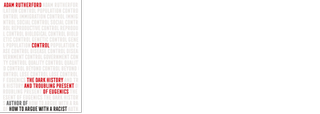One Party After Another: the ‘best biography of Nigel Farage’
Michael Crick tells the story of how Farage came to play such a decisive role in British politics

“This is a short book about a big subject,” said Katy Guest in The Guardian: a nuanced and “persuasive” account of what Adam Rutherford calls the “dark history and troubling present of eugenics”. With an admirable lack of alarmism, Rutherford, a geneticist, shows how the aspiration to craft society “by biological design” is one that has existed for millennia: Plato, for instance, in his Republic, envisaged “inferior” citizens being discouraged from breeding.
The man regarded as the father of modern eugenics is the Victorian polymath Francis Galton, said Tim Adams in The Observer. His idea of “positive eugenics” (using selective breeding to raise the calibre of humans) inspired disciples from across the political spectrum, including a young Winston Churchill, the liberal reformer William Beveridge, and the birth-control pioneer Marie Stopes. But though eugenicist ideas flourished in the early decades of the 20th century, they were dealt a seemingly killer blow by the “genocidal atrocities” of the Nazis.
Not quite, said Philip Ball in the FT: eugenicist ideas never really went away. Even after the Second World War, enforced sterilisation persisted in many countries. In California, the practice was only banned in prisons in 2014. And now, eugenics is being given a new boost by the emergence of modern genetics. In the near future, some predict, parents will be able to “choose” desirable traits in their children – either by selecting between screened embryos, or by editing their offspring’s genomes.
Subscribe to The Week
Escape your echo chamber. Get the facts behind the news, plus analysis from multiple perspectives.

Sign up for The Week's Free Newsletters
From our morning news briefing to a weekly Good News Newsletter, get the best of The Week delivered directly to your inbox.
From our morning news briefing to a weekly Good News Newsletter, get the best of The Week delivered directly to your inbox.
Rutherford insists that such approaches are unlikely to work, given the near-impossibility of discerning a specific trait from the fiendishly complex interactions of genes. But even if Rutherford is surely right to call eugenics a “busted flush”, he’s also wise to warn of the dangers of a revival.
Weidenfeld & Nicolson 288pp £12.99; The Week Bookshop £9.99

The Week Bookshop
To order this title or any other book in print, visit theweekbookshop.co.uk, or speak to a bookseller on 020-3176 3835. Opening times: Monday to Saturday 9am-5.30pm and Sunday 10am-4pm.
Create an account with the same email registered to your subscription to unlock access.
Sign up for Today's Best Articles in your inbox
A free daily email with the biggest news stories of the day – and the best features from TheWeek.com
-
 What is rock flour and how can it help to fight climate change?
What is rock flour and how can it help to fight climate change?The Explainer Glacier dust to the rescue
By Devika Rao, The Week US Published
-
 Crossword: April 19, 2024
Crossword: April 19, 2024The Week's daily crossword puzzle
By The Week Staff Published
-
 In what states is abortion legal, illegal, and in limbo?
In what states is abortion legal, illegal, and in limbo?In The Spotlight Where American states stand on abortion care
By Theara Coleman, The Week US Published
-
 6 serene homes in Vermont
6 serene homes in VermontFeatures Featuring a four-level Shaker barn in Hartland and a Scandinavian-inspired home in Stowe
By The Week US Published
-
 Amanda Montell's 6 favorite books that will expand your knowledge
Amanda Montell's 6 favorite books that will expand your knowledgeFeature The linguist recommends works by Mary Roach, Alice Carrière, and more
By The Week US Published
-
 Rowan Beaird recommends 6 compelling books from the 1950s
Rowan Beaird recommends 6 compelling books from the 1950sFeature The author recommends works by Patricia Highsmith, Shirley Jackson, and more
By The Week US Published
-
 6 spacious homes with great rec rooms
6 spacious homes with great rec roomsFeature Featuring a suspended fireplace in Arizona and a marine-themed home in Maine
By The Week Published
-
 Recipe: gnocchi di spinaci (spinach gnocchi)
Recipe: gnocchi di spinaci (spinach gnocchi)The Week Recommends Forget the potatoes for this gnocchi made of the 'classic combination' of spinach and ricotta
By The Week UK Published
-
 Stephen Graham Jones' 6 scary books with deeper meanings
Stephen Graham Jones' 6 scary books with deeper meaningsFeature The best-selling author recommends works by Stephen King, Sara Gran, and more
By The Week US Published
-
 6 stylish homes on the top floor
6 stylish homes on the top floorFeature Featuring a 1925 art deco high-rise in San Francisco and a factory-turned-home in Los Angeles
By The Week US Published
-
 The Anxious Generation: US psychologist Jonathan Haidt's 'urgent and essential' new book
The Anxious Generation: US psychologist Jonathan Haidt's 'urgent and essential' new bookThe Week Recommends Haidt calls out 'the Great Rewiring of Childhood' phenomenon
By The Week UK Published